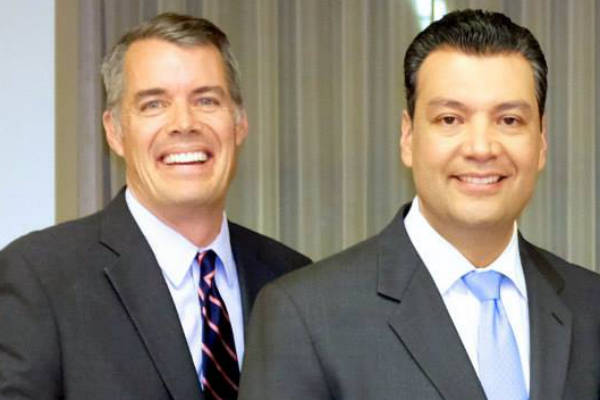
Secretary of State candidates Pete Peterson (left) and Alex Padilla. (Photo Credit: Christopher Nelson)
If you’re an engaged California voter looking for stark contrast in this year’s campaign for Secretary of State’s then you’ll be disappointed, because the candidates likely agree on more issues than disagree.
A conversation between the two candidates left standing for Secretary of State, hosted by Public Policy Institute of California (PPIC) yesterday, revealed that Democratic State Senator Alex Padilla and Republican Pete Peterson, Executive Director of the Davenport Institute for Public Engagement and Civic Leadership at Pepperdine University, appear to differ more on their approach to the office than on substantial policy grounds.
Both highly qualified candidates pledged to use more technology and data to reverse declining voter participation and make the office more efficient. But they also both say their own differing backgrounds make them best suited to reforming the state’s elections office.
Peterson is from academia with a civic engagement background, often cites think tank studies on California elections, and touts the benefits of using public-private partnerships to boost the performance of the office. Padilla makes note of his time in local and state government and leadership positions at civic organizations to emphasize deep knowledge of the Capitol and leveraging public resources as vital to accomplishing goals in Sacramento.
CA Fwd does not endorse candidates, but can certainly get behind many of the candidates’ ideas that may lead to a new vision of governance at the Secretary of State’s office. Here’s what we heard yesterday:
Will technology solve all of the Secretary of State’s problems?
If you tuned into any part of the discussion, then you know the answer is a resounding yes. Padilla and Peterson touted improved technology as the solution to California’s cumbersome campaign finance disclosure portal (Cal-Access), providing better voter information, increasing voter turnout and registration, improving the voter experience, and streamlining the business registration system.
Padilla wants to develop a ballot pamphlet app that voter can access on their mobile and tablet devices. He also seeks to modernize Cal-Access, making it more reliable, fast and user-friendly, and provide real-time disclosure of campaign finance information. Padilla wants to see the business filing system become a truly digital experience, shunning the current process printing PDF’s, scanning, then resubmitting.
Peterson believes modernizing voting technology can make the election experience more attractive to voters through easy translation of the ballot and moving away from a “first generation” voting system. He sees outside organizations like MapLight and Brigade as a means to bridge the state’s technology troubles and explicitly stated he’s like the state to move away from buying technology.
Use of open data to make smart governance decisions
A longtime advocate of greater governmental transparency, CA Fwd has promoted open data as an essential tool to fuel economic growth and enhance government decision-making.
Alex Padilla said he would use demographic data to predict the growth of ethnic groups so county registrars would know further in advance of when Voting Rights Act language requirements kick in. The current method is to wait for the Department of Justice to send a letter, which may be a few months before Election Day.
Pete Peterson sees the Secretary of State’s office spending less time developing and procuring technology while heading in a direction to lead the state in opening up important data. He aims to create a “Coming and Going Report” using business data to show trends and identify reasons why businesses in California are opening or closing.
Open Primary
An important point of agreement for CA Fwd is the recognition by the candidates that the open primary has changed the environment and tenor of Sacramento. Moderating candidates and changing the nature of how candidates approach electoral contests has led to on-time budgets and bipartisan deals on water and budget reserves. The open primary has also produced two very strong candidates for Secretary of State.
We’ll learn more about these two candidates’ ideas when they meet again on October 9 at a UC Berkeley forum hosted by John Myers of KQED.

